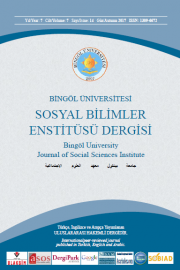İMPARATORLUKTAN
KÜRESELLEŞMEYE DİL VE İKTİDAR
Language and Power From Empire to
Globalization
Author(s): Ahmet KayıntuSubject(s): Cultural history, Customs / Folklore, Political history, Cultural Anthropology / Ethnology, Culture and social structure , Geopolitics
Published by: Bingöl Üniversitesi Sosyal Bilimler Enstitüsü
Keywords: English; empire; language; hegemony;
Summary/Abstract: The aim of this study is to analyse the role of English language in the formation of British Empire in the light of discourse and power by Michel Foucault and hegemony by Antonio Gramsci. Languistic studies, works of literature and art have been studied in isolation from political discouses, power relations on the grounds that they are personal, individual or trancendental fields. The process has been overturned following the prevalence of the concept of Orientalism –a concept put forward by Edward Said to describe the image of East in the Western literature and culture which was, then, evolved into postcolonial studies. Due to the reception of Orientalism and postcolonial studies the role of language, literature and art in the formation of ruling power, national state and national identity have been reconsidered. In this context, the most striking examples are undoubtedly in the process of exalting British language and literature and presenting it as the only alternative, furthering, and sometimes disregarding, other languages, arts and cultures in the formation, strengthening and conquest of the British Empire.
Journal: Bingöl Üniversitesi Sosyal Bilimler Enstitüsü Dergisi (BUSBED)
- Issue Year: 7/2017
- Issue No: 14
- Page Range: 65-82
- Page Count: 18
- Language: Turkish

